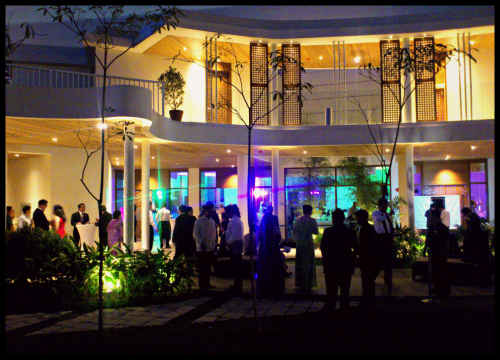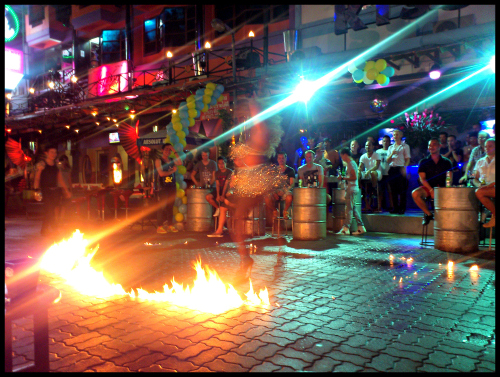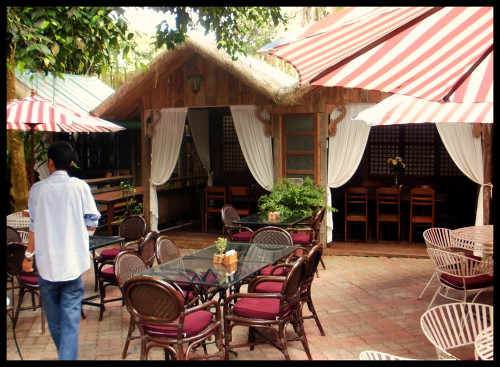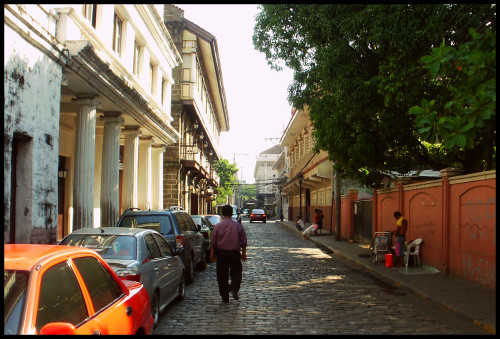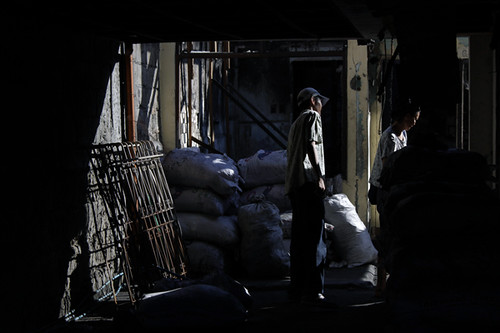My maternal grandmother—her name is Auring—no, Aurora—turned ninety-eight a few days ago. Ninety-eight! We threw her a party. The date fell on a Sunday. From the barangay chapel she was carried up by carers Lita and Yoly into a family van for the lunchtime celebration in Fairview, on the northeast side of Manila, with the Ascaño clan. The wheelchair was folded and put in the back, her medicines and tissue box and thick brown cotton scarf in a canvas bag; the priest, who had been invited to give the blessing, and whose name I never remember, took the front passenger seat. There wasn’t enough space in the first car, so the rest of us jumped into another van, joined by the apple-mouthed roasted suckling pig from La Loma.
For the party grandmother looked her most beautiful. She wore her pearl earrings. She chose another, thinner scarf, boldly patterned and more silky, to put around her neck. Then someone (probably Lita) applied makeup on her, which made her cheeks as rosy and pink as ever. She was also made to wear green-tinted glasses, the design of which could be best described as vintage. “Make a wish!” a few guests cried, right before the chant to get her to blow the candles. Like she could still hear! Which of course she couldn’t. Wax was on the cake by the time she realized what it was we were egging her on to do.
Imagine if the number of candles had matched her age. (There were only six.) Grandmother, born in 1916, looked, apart from happy, a bit confused. Which makes sense, in a way. So many descendants! Her children’s wives, husbands, sons, daughters. Yet none of us who surrounded her were around when her life began; how strange she must have felt looking through those Instagram-worthy lenses. She grew up in Tuguegarao, Cagayan, about five hundred kilometers north of Manila. She has fair skin, eyes that you would doubt are of brown, and soft thin hair that in all her photographs never looked just Filipino black. There could be a genetic explanation for this: according to what I’ve been told, Germany’s interest in newly independent Philippines, cut short by the Treaty of Paris in 1898, in the event somehow left a settlement in these islands, a settlement that eventually produced grandmother. I know nothing of the rest of her origins and beginnings; to me they’re colored in sepia. I do know she married a dentist. She loved him very much and they were never apart. They had eight children. She has outlived four. Her husband—my Lolo Opong (Rodolfo)—was tall, dark, and handsome. He was a quiet man who always wore sunglasses—not out of necessity; it was just part of his style. Those Ray-Bans! That cane. Those Camisa de Chinos and grandfatherly slacks. His cigar! He died in the early nineties, a few years after the big earthquake. I could still smell him. How grandmother must miss this man, the love of her life. How does it feel, Aurora? To have to carry on like you do. To go through nearly a century of bearing witness to life’s most hapless certainties: love, loss, death.
The day before the party grandmother actually told us this was going to be her last birthday. No one could blame her. I’d have given up long ago. She can no longer walk or stand. She is suddenly the old, unvisited widow. She is Emmanuelle Riva in Amour, all rigid legs and wiry bangs and heavy elbows and clattering teaspoons, but without a Jean-Louis Trintignant by her side to sing “Sur le pont d’Avignon”. Not that it would matter: she has, as I’ve said, turned deaf; if she did hear anything it would be the voice of grandfather. Every day is the same: sleep, eat, take pills, wipe nose, brush teeth, pray the rosary, sleep again. Every evening after dinner Lita puts a mask on her face to deliver extra supplies of oxygen. Here’s grandmother holding on to those holy beads while her exhalations come out of the mask in a kind of vaporous dance. It’s sometimes hard to watch. If it weren’t for the fall five or six years ago that knocked her out, fractured her pelvis, and brought on episodes of delirium, she’d probably still be rearranging the furniture, or watering the plants, or decorating the altar. This was the sort of work that made her happy: to configure the world, or at least the house, in ways that marked her authority and independence—in ways that were her own.
Her most recent nurse died last month. (The three previous ones had all left to work in the Middle East.) We couldn’t even break the news, fearing that the shock of it would be unnecessary, would do grandmother no good in her current state. Ed was only twenty-eight. He died on his birthday, in his sleep, on a floor mattress right next to grandmother’s bed. The whole business was as dreadful as it sounds. She had—has—no clue. By the time Lita went to wake the young man early that morning, his lips were already blue. Ed hadn’t even been more than two weeks into the job. When grandmother soon began to ask questions, we said simply that “he’s gone home.” Which wasn’t entirely a lie, and which we supposed, in hindsight, was a version of the truth.
About a week ago at the veranda, after she had been wheeled out and served her coffee and pastries, I went to say hello. “Ed?” she asked. “Is that you?” Her eyes shone, and her words—they sent a chill down my spine. But I didn’t have it in me to correct her. If all the years and tragedies should leave her muddled, if this birthday was indeed going to be her last, if it was her belief that there existed an other side by which Lolo Opong was waiting, let the woman call me by a dead man’s name. Let her see and hear what we don’t. Ler her dreams and imaginings bloom—and bloom spectacularly. What difference does it make?
One of my earliest memories of grandmother was when she used to spend part of every summer in the Manila ancestral house, which we had since lost to a big fire. This was at the young age when I could predictably be bribed with cookies. My mother, who always urged us children to spend time with grandmother, would say, “She has plenty of Chips Ahoy to give away to you all.” So we ran playfully from our apartments at the back of the house to where grandmother stayed: the main “unit,” which was called the Big House, for it covered half of our land’s 240 square meters, with three bedrooms, three bathrooms, built-in closets, a balustraded balcony, and all sorts of Spanish colonial furniture. Outside her window stood a tamarind tree, in sunny days looking somewhat like out of a painting. There was also a mirror at the old-fashioned dressing table in her room that spooked us: it was old and dirty and it warped our faces into faces we didn’t recognize. But we raced up the stairs anyway to take grandmother’s hand and, with it, bless our new-generation foreheads; we eyed the molded glass jar in which she had kept the cookies, and we stuck our five-, six-, seven-year-old hands into the bottom where bits and chips of sweet, chocolatey bribery had crumbled; then we climbed grandmother’s warm bed and jumped up and down, the lace curtain swaying to the slow, lazy orchestra of summer afternoons.
Dearest Aurora, I’m not your nurse Ed. Ed is dead. His body is buried in the province. My name is Miguel, your youngest daughter’s second son. I used to eat all the Chips Ahoy. No, I still have not married. I don’t have kids. But I think I have found someone whom I’d like you to hang around long enough to meet. A man, grandmother; a man. He’s Welsh and all kinds of lovely. Please don’t think this strange. I understand that so much has changed about the world since you were born, and if, through your lenses, you now find it hardly recognizable, if you feel like your place in it is not quite what it once was, I hope anyway that the twilight of your life brings some form of clarity: your blood still runs through my veins. The love that flows out of my chest is the same that, for grandfather, flowed out of yours. So to you I raise a toast and say—please allow me to wax Virgilian here—your descendants shall gather your fruits, of which you can rest assured there is a sweet abundance. Thank you, grandmother, and happy birthday.
Funny. In the middle of the party, she decided to take a siesta; the journey, then the socializing, had tired her out. “Where did she go?” guests asked, over cupcakes and tequila. “Has she gone home?” Lita and Yoly took turns answering: no, Aurora just needs to rest a little, but she’ll come right back out.

